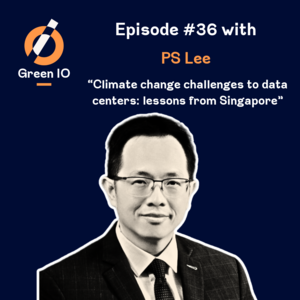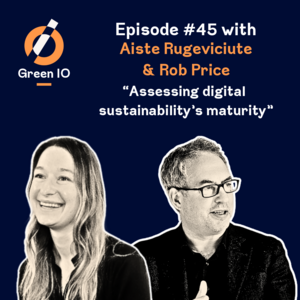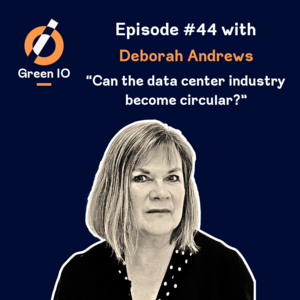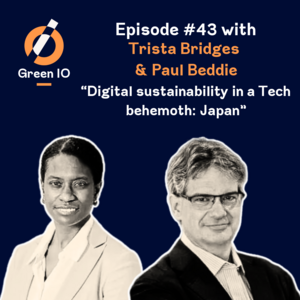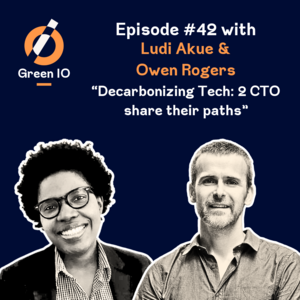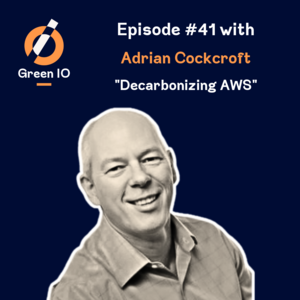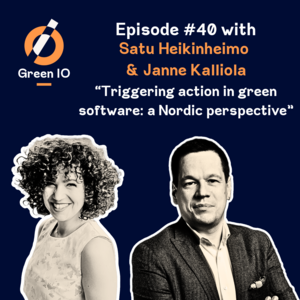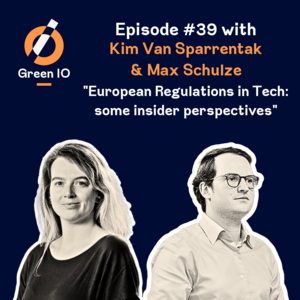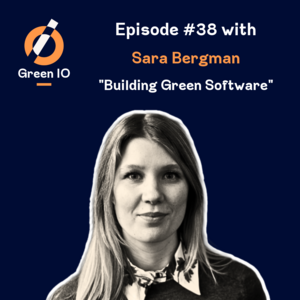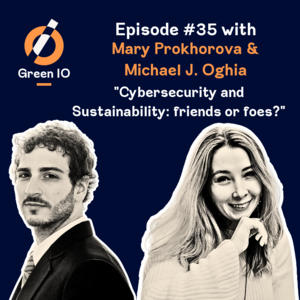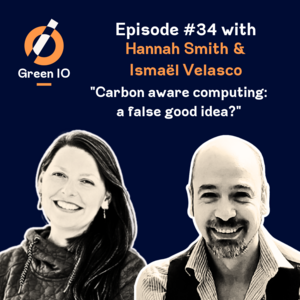#36 - Climate change challenges to data centers: lessons from Singapore with PS Lee
Update: 2024-04-09
Description
📈 44 cm water level rise under the IPCC business as usual scenario.
This number shows that climate change is very real for Singaporeans and for their data centers, close to 10% of the whole of APAC!
🎧In episode 36, Gaël Duez discussed with Professor PS Lee, National University of Singapore Dean's Chair of Mechanical Engineering and one of the top experts worldwide on data center cooling, the challenges in making data centers sustainable.
🔍Some key points of their exchange are:
🌡️why temperature rise has multiple downside
🌡️energy challenges that affects the sustainability of data centers
🌡️liquid cooling technology as an important option
🌡️why lessons from DC operating in tropical climate apply almost everywhere
And much more!
❤️ Subscribe, follow, like, ... stay connected the way you want to never miss an episode!
📧 Once a month, we deliver carefully curated news on digital sustainability packed with exclusive Green IO contents in your mailbox, subscribe to the Green IO newsletter here.
📣 Green IO next Conference is in Singapore on April 18th (use the voucher GREENIOVIP to get a free ticket)
Learn more about our guest and connect:
📧 You can also send us an email at greenio@duez.com to share your feedback and suggest future guests or topics.
Poh Seng's sources and other references mentioned in this episode:
- Coastal Risk Screening Tool
- A Heat Dome Hits Virginia: One Data Center's Story
- Singapore Climate 2023: The Year in Numbers
- World Without End by Christophe Blain and Jean-Marc Jancovici
- Future of the human climate niche
- Tan Tin Wee
- SUSTAINABLE TROPICAL DATA CENTRE TESTBED
- EED
Transcript
Gaël Duez 00:21
Hello everyone. Welcome to Green IO with Gaël Duez. That's me. Green IO is a podcast for responsible technologists building a greener digital world one byte at a time, twice a month on a Tuesday. All guests from across the globe share insights, tools and alternative approaches enabling people within the tech sector and beyond to boost digital sustainability. Because accessible and transparent information is in the DNA of Green IO, all the references mentioned in this episode, as well as the transcript will be in the show notes both on your podcast platform and on our website greenio.tech when it comes to sustainability, I have a sweet spot for Singapore because of its uniqueness. This is one of the top cities in the entire world which has benefited the most from the global extractivist, highly carbonized and financialized economy, and also one of its most at risk of climate change. Hence a blossoming of initiatives there on how to both pivot towards more sustainability and mitigate climate change impacts. And these efforts apply especially to the backbone of its infrastructure data centers. As we are growing aware that the human body has some physiological limits that can be reached during heat waves where the wrong mix of high temperature and humidity is reached. It's death for people staying outside too long and this concerns everyone, not only the populations usually at risk like infants or elderly people. It was really well illustrated by Jancovici Jean-Marc and Blain Christophe in their international bestseller comics World Without End and based on a 2020 mega study published in Environmental Sciences, a third of humankind is now at risk to live in places where temperature could be lethal several weeks per year. Well, everything that I just said about humans applies to data center equipment which also needs to be cooled down 24/7 for many obvious reasons. Starting with latency and sovereignty, we cannot move all data centers in the world where the air will remain cool like the Nordics. Hence a serious challenge for the tech industry, how to run a sustainable data center and more specifically how to build sustainable data center hubs where tropical climate creates hurdles which are getting bigger due to climate change. To discuss this, I'm honored to have Professor P. S. Lee on the show. Based in Singapore, PS is National University of Singapore Dean's Chair of Mechanical Engineering and one of the most cited scientists in mechanical engineering and transport energy rings worldwide. He has specialized in data center engineering for two decades and he is also a field practitioner. The founder of Coolers DC, what a cool name, which advises top DC operators like Equinix or Meta. He will also be our keynote speaker at the Green IO Singapore Conference in two weeks, April 18 to be precise. One reason among many reasons to join the first conference in Asia focusing 100% on green it and Green IO. Listeners can get free tickets using the Voucher GREENIOVIP and how exciting it is to kickstart my discussion with Professor Lee. Welcome, Poh Seng. Thanks a lot for joining Green IO today.
PS Lee 03:54
Hi guys, thanks for having me. So it's my pleasure to be on your podcast.
Gaël Duez 03:59
So PS, I played again with the excellent Climate Central's coastal risk screening tool, which enables people to simulate the impact of a sea level rise, among other impacts. And the results were already concerning for a 44 cm water level rise, which is the current IPCC best estimator for the business as usual scenario with most of the iconic gardens by the bay in Singapore under the water. And if we simulate a 2 meters rise, a likely scenario. If some tipping points with ice in Greenland or Antarctica are reached, well, the entire Singapore's harbor is at risk. My point is, climate change is very real for Singaporeans. Could you maybe explain to us why and what is more precisely at stake here?
PS Lee 04:53
Sure. I would like to refer to the recently published 2023 Singapore Climate Reports, which marks an alarming continuation of global warming trends, with Singapore experiencing its fourth warmest year since unprecedented temperatures, especially during the months of May and October. This underlined the urgency of addressing climate change. The report's projection of up to 326 high heat stress days by 2099 in high emission scenarios starkly highlights the impending challenges, especially for industries like the IT sector.
Gaël Duez 05:33
Correct me if I'm wrong, but Singapore is a very massive IT hub in Southeast Asia, is that correct?
PS Lee 05:42
Yes. As of two to three years ago, in Singapore, the total data center capacity is actually close to 1, that is close to the 10% of the whole of APAC. So for city states to be hosting that kind of capacity is actually quite amazing, but it's actually important to manage the power and the associated carbon footprint. So it is. Right now, the data center industry is already consuming 7% of Singapore total electricity consumption. And if we don't manage this in a couple of years, this can actually go up to 12%. So that's why the Singapore government has actually imposed a data center moratorium about two and a half to three years ago, which they finally left the year before. Thereafter, there was a data center call for application, which the industry expected to meet very stringent criteria, including PUE, no more than 1.3, as well as the adoption of innovative and sustainable data center solutions.
Gaël Duez 06:59
You mean that for two years and a half it was not permitted to build new data center facilities in Singapore.
PS Lee 07:07
That's right.
Gaël Duez 07:08
And just to make sure I understood well it's already 7% of electricity consumption and it could triple with the current trend.
PS Lee 07:17
Yes and especially with the interest in AI in other high power workloads. So if we don't manage this in a sustainable fashion, this percentage is certainly going to increase very sharply over the next couple of years.
Gaël Duez 07:35
So clearly the S
Comments
Top Podcasts
The Best New Comedy Podcast Right Now – June 2024The Best News Podcast Right Now – June 2024The Best New Business Podcast Right Now – June 2024The Best New Sports Podcast Right Now – June 2024The Best New True Crime Podcast Right Now – June 2024The Best New Joe Rogan Experience Podcast Right Now – June 20The Best New Dan Bongino Show Podcast Right Now – June 20The Best New Mark Levin Podcast – June 2024
In Channel

